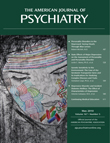Automatic and Strategic Representation of the Self in Major Depression: Trait and State Abnormalities
Abstract
Objective
Dysfunctional negative thoughts about the self have long been hypothesized to reflect mood-independent cognitive vulnerability for major depressive disorder. These thoughts are believed to be predominantly automatic, in that they are involuntary and hard to inhibit. However, existing empirical evidence provides limited support for this theory, instead emphasizing the role of intentional ruminative (i.e., effortful) thoughts. To help clarify this theoretical controversy and investigate biased processing of emotional self-referent information in major depression, the authors utilized event-related brain potentials, which are used to index neural engagement during specific stages of cognitive processing.
Method
The P2 and late positive event-related brain components were examined during a free recall task in patients with current (N=17) or remitted (N=18) major depression and healthy comparison subjects (N=17). Participants made judgments on whether a word described them (self-referential condition) or former U.S. President Bill Clinton (other-referential condition).
Results
Healthy comparison subjects and subjects with remitted, but not current, major depression demonstrated enhanced recall of positive self-referent items. Greater component amplitudes in response to negative relative to positive self-referent items were evident in individuals with current and remitted major depression during the automatic processing stage (indexed by the P2 component) and in individuals with current depression during effortful encoding (indexed by the late positive component).
Conclusions
Observed mood-independent abnormalities in automatic processing and mood-dependent abnormalities in effortful processing of emotional self-referent information provide direct support for an integrative theory of cognitive dysfunction in major depression, which amalgamates two main, but largely competing, theories of the disorder.



